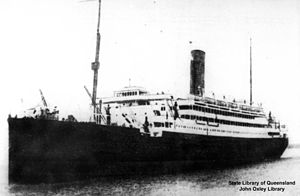RMS Alcantara (1913)

RMS Alcantara
|
|
| History | |
|---|---|
|
|
|
| Name: |
|
| Owner: |
|
| Operator: |
|
| Port of registry: |
|
| Route: | Southampton – Rio de Janeiro – Montevideo – Buenos Aires |
| Builder: | Harland and Wolff, Govan |
| Yard number: | 435G |
| Launched: | 30 October 1913 |
| Completed: | 28 May 1914 |
| Commissioned: | 16 April 1915 |
| Maiden voyage: | 19 June 1914 |
| Fate: | sunk 29 February 1916 |
| General characteristics | |
| Class and type: | A-series |
| Type: |
|
| Tonnage: | 15,831 GRT |
| Length: | 570 feet (170 m) |
| Beam: | 67.2 feet (20.5 m) |
| Propulsion: | 2 × triple-expansion engines, 1 × low-pressure steam turbine, 3 × screws |
| Speed: | 18 knots (33 km/h) |
| Armament: |
|
| Notes: | |
SS Alcantara was an ocean liner that went into service just weeks before the start of World War I, was converted to an armed merchant cruiser in 1915, and was sunk in combat with the German armed merchant cruiser SMS Greif in 1916.
Harland and Wolff in Govan built Alcantara for the Royal Mail Steam Packet Company. She was one of the later members of RMSP's "A-series" of liners, which had begun with RMS Aragon launched in 1905. In common with all of the last four "A-series" ships, Alcantara had three screws. A pair of four-cylinder triple-expansion steam engines drove her port and starboard screws, and a Parsons low-pressure steam turbine drove her middle screw.
Alcantara was launched on 30 October 1913 and made her maiden voyage in June 1914 on RMSP's route from Southampton to Rio de Janeiro, Montevideo and Buenos Aires.
In April 1915 the Admiralty requisitioned Alcantara and her "A-series" sisters Avon, Arlanza and Andes to be armed merchant cruisers. She was armed with six 6 in (150 mm) guns,anti-aircraft guns and depth charges. On 17 April at Liverpool she was commissioned into the Royal Navy's 10th Cruiser Squadron as HMS Alcantara.Arlanza and Andes were also commissioned into the 10th Cruiser Squadron, which joined the Northern Patrol that was part of the First World War Allied naval blockade of the Central Powers. The Squadron patrolled about 200,000 square miles (520,000 km2) of the North Sea, Norwegian Sea and Arctic Ocean to prevent German access to or from the North Atlantic.
...
Wikipedia
